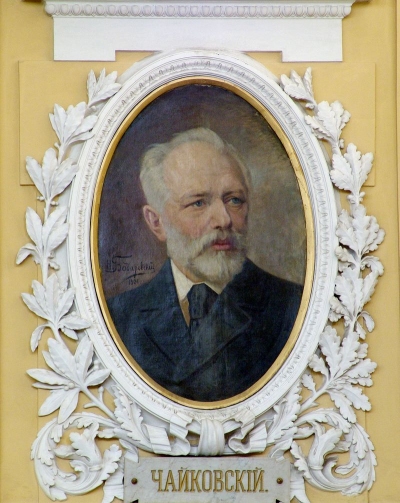

Portrait by N. K. Bodarevsky, 1901.
Pyotr Il’ich Tchaikovsky was an outstanding Russian composer, conductor and public figure. He wrote 11 operas (one of them was destroyed by the composer), including “Eugene Onegin” (1878), “The Queen of Spades (1890) and “Iolanta” (1891); ballets – “Swan Lake (1876), “Sleeping Beauty” (1889) and “The Nutcracker” (1892), orchestral works – seven symphonies (N.1 Winter Reveries, 1866, 1874; N.2, 1872, 1879, dedicated to the Moscow Branch of the Russian Music Society; N.3, 1875; N4, 1878; the “Manfred” Symphony, 1885; N.5, 1888; N.6 Pathetique, 1893), four suites for orchestra (among them N.4 – “Mozartiana,” 1887), fantasy overtures – “Romeo and Juliet” (1869) and “Francesca da Rimini” (1876), three concertos for piano and orchestra (1875, 1880, 1893); one violin concerto (1878), “Serenade Melancolique” (1875), “Valse-Scherzo” for violin and orchestra (1877); a number of cantatas (among them “Moscow,” 1883), Variations on a Rococo Theme for cello and orchestra (1876), three string quartets, the Piano Trio “In Memory of a Great Artist” (1882), numerous compositions for piano (sonatas, “The Seasons,” 1876), songs and many other works (See: Thematic-Bibliographical Index of Compositions by P.I. Tchaikovsky. Moscow, 2003).
In his youth Tchaikovsky took piano lessons with the well-known pianist Rudolf Kundiger. In 1859 he graduated from the School of Jurisprudence in St. Petersburg and, having obtained the rank of Titular Counselor, was determined for service in the Ministry of Justice. In 1861 he began attending the music courses organized by the Russian Musical Society (RMS), which was transformed in 1862 into the St. Petersburg Conservatory. He studied orchestration with Anton Rubinstein, music theory with Nikolay Zaremba, and also took a course of organ performance. In 1865 he graduated from the Conservatory with honors. Having left his public service in 1867 with the acquired title of Court Counselor, Tchaikovsky followed his calling and devoted himself entirely to music. This was when Nikolay Rubinstein invited him to teach at the music courses of the RMS in Moscow.
At the inauguration of the Moscow Conservatory on September 1, 1866 Tchaikovsky performed his piano transcription of the Overture to Mikhail Glinka’s opera “Ruslan and Ludmila”.
From 1866 to 1878 Tchaikovsky was a professor at the Moscow Conservatory, teaching specialized music theory, elementary music theory and harmony, and was a member of the Council of Professors. Beginning with the 1870-1871 season, he taught the second-year harmony course, as well as the course orchestration, combined together with free composition. He summarized his teaching experience in his textbook “Guide to a Practical Study of Harmony” (1869–71, published in 1872, subsequently republished numerous times). He also translated into Russian a number of texts by European music theorists (including the “Catechism of Music” by Johann Christian Lobe, 1870). Among his best pupils were Sergey Taneyev and Nikolay Klenovsky.
The composer preserved a close connection with the Moscow Conservatory until the end of his life. Nikolay Rubinstein, the artistic director of the RMS in Moscow, was considerably conducive to the successful development of Tchaikovsky’s career as a composer. Many compositions were commissioned to him for particular concert seasons of the Society. Among them were his first three symphonies, a number of overtures and the three string quartets, the last of which was dedicated to the memory of Ferdinand Laub, who had participated in the premiere performances of the first two string quartets. Nikolay Rubinstein was the first performer (both as a pianist and a conductor) of a number of Tchaikovsky’s compositions, and the composer considered him to be the best interpreter of his music. In 1885 Tchaikovsky accepted the invitation to become one of the directors of the Moscow Branch of the IRMS. The composer also owed a lot for his success to the Moscow Conservatory, many of the professors of which became the first performers of his compositions. For example, Sergey Taneyev was the pianist at the Moscow premiere of the First Concerto for Piano and Orchestra in 1875. In 1879 the composer entrusted the premiere of his opera “Eugene Onegin” to the Conservatory’s students. Tchaikovsky dedicated many of his compositions to his colleagues at the Conservatory, as well as to his students, who later became his friends and performers of his music.
A number of concerts of performances of Tchaikovsky’s works by the faculty members and students of the Moscow Conservatory went down in history, among which was the premiere of the Piano Trio “In Memory of a Great Artist” on March 11 1882, on the anniversary of Nikolay Rubinstein’s death, with the participation of Sergey Taneyev, Ivan Grzhimali and Wilhelm (Vasily Feodorovich) Fitzenhagen. The composer received a powerful impression from the first orchestral reading of his Sixth Symphony by Conservatory students under the direction of Vasily Safonov.
Upon the decision of the Artistic Council from October 29 1885, Pyotr Il’ich Tchaikovsky was given the title of Honorary Member of the Moscow Conservatory.
Tchaikovsky’s untimely decease was perceived as a great loss. Concerts and evenings held at the anniversary of the day of the composer’s death became a tradition at the Moscow Conservatory. In 1917 Tchaikovsky’s name was bestowed upon the Conservatory’s Opera-Vocal Studio, which had been organized by Mikhail Ippolitov-Ivanov and Varvara Mikhaylovna Zarudnaya-Ivanova. On May 7 1940, upon the Decree of the Supreme Soviet of the USSR the Moscow Conservatory was officially named after Tchaikovsky. At the same time the P.I. Tchaikovsky Stipends were instituted for especially gifted students of the Composition Department. In 1954 the statue of the outstanding Russian composer was placed in front of the Moscow Conservatory building.
In 1958 the International P.I. Tchaikovsky Competition for Performers was established, organized since then every four years in Moscow.